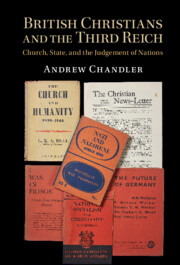Book contents
- British Christians and the Third Reich
- British Christians and the Third Reich
- Copyright page
- Dedication
- Contents
- Acknowledgements
- Introduction
- Part I An Inhabited Landscape
- Part II The German National Revolution, 1933–1934
- Part III Resisting a Rapprochement, 1935–1937
- 6 Uneasy Calm
- 7 A Dubious Stability
- 8 A Papal Encyclical, a World Conference and an Arrest
- Part IV Crisis, 1938–1939
- Part V The Onslaught, 1939–1943
- Part VI A Gathering Judgement, 1944–1949
- Endings and Legacies
- Bibliography
- Index
7 - A Dubious Stability
1936
from Part III - Resisting a Rapprochement, 1935–1937
Published online by Cambridge University Press: 05 May 2022
- British Christians and the Third Reich
- British Christians and the Third Reich
- Copyright page
- Dedication
- Contents
- Acknowledgements
- Introduction
- Part I An Inhabited Landscape
- Part II The German National Revolution, 1933–1934
- Part III Resisting a Rapprochement, 1935–1937
- 6 Uneasy Calm
- 7 A Dubious Stability
- 8 A Papal Encyclical, a World Conference and an Arrest
- Part IV Crisis, 1938–1939
- Part V The Onslaught, 1939–1943
- Part VI A Gathering Judgement, 1944–1949
- Endings and Legacies
- Bibliography
- Index
Summary
In 1936 the Methodist W.F. Lofthouse published a new study, Christianity in the Social State.1 ‘If there is one ideal’, he wrote there, ‘which can lift men to devotion and self-denial, it is a conception of the State which renounces all that religion, or at least Christianity, has held sacred in the past.’ The German state now represented an autocracy ‘curiously like that of the Russian Communists’, though where race and blood counted for nothing in Russia, they were all in Germany. Lofthouse was sure that this was a totalitarian state. As such it must be opposed, in every respect, to Christianity.2
- Type
- Chapter
- Information
- British Christians and the Third ReichChurch, State, and the Judgement of Nations, pp. 169 - 179Publisher: Cambridge University PressPrint publication year: 2022

